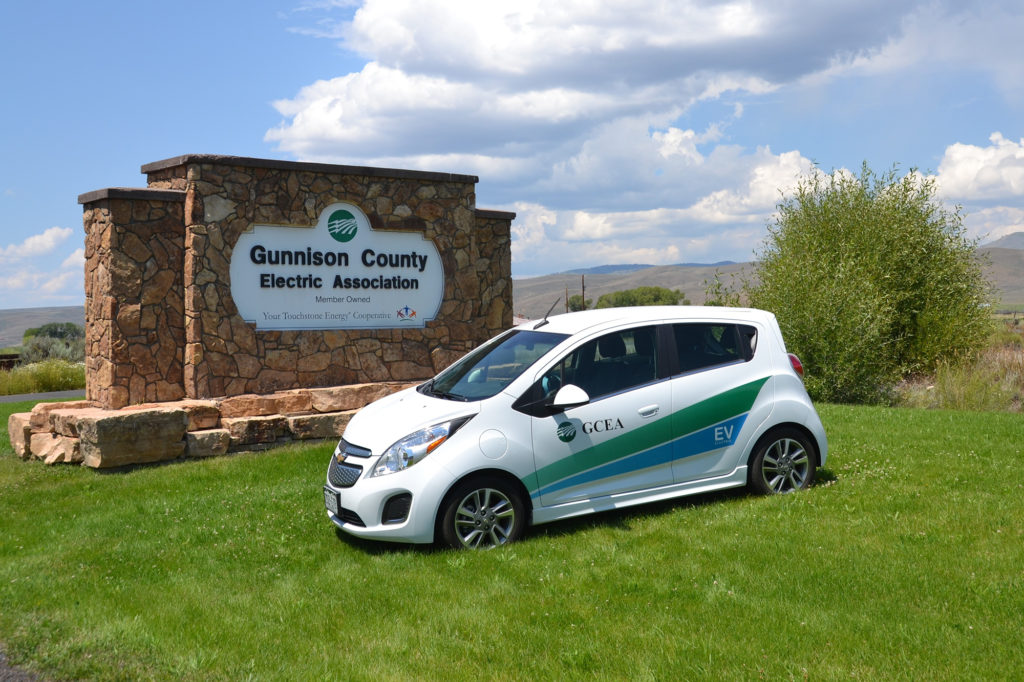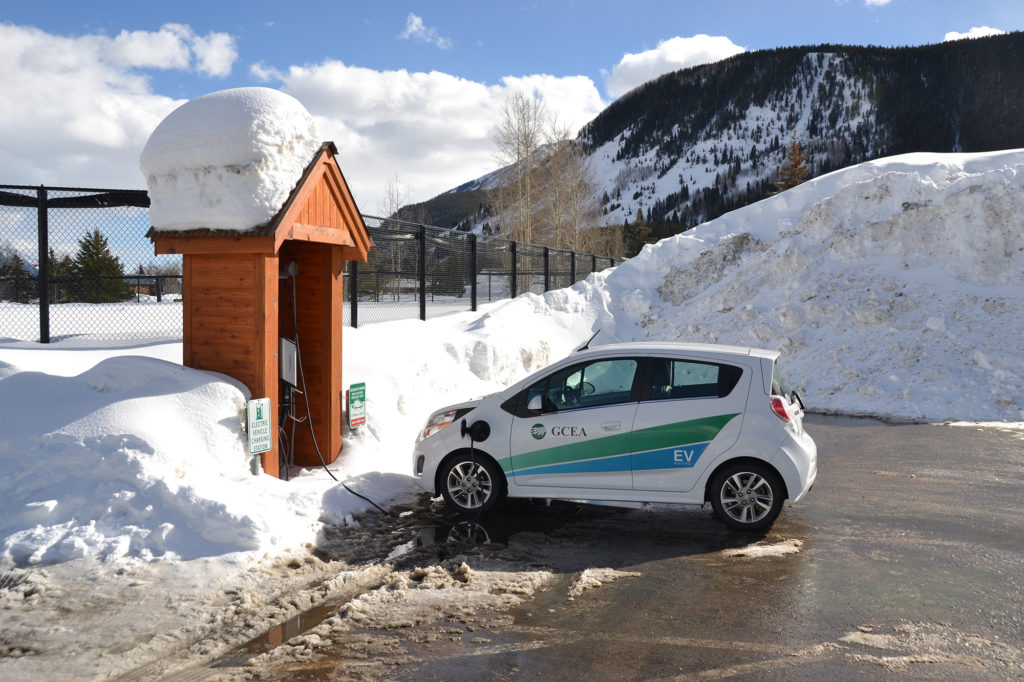
When you need a loaner car, you probably think of Enterprise or Hertz, but residents of one Colorado community have another option: Their co-op has an electric car they can borrow.
Gunnison County Electric Association isn’t really in the car business, but it’s been ahead of the curve promoting electric vehicles. It was the first Colorado co-op to own and operate public charging stations. That first facility is so popular that in a year’s time it nearly doubled the number of charging sessions to almost 200 in the first three quarters of 2017.
GCEA also owns a 2014 all-electric Chevrolet Spark, dubbed Spark-e. The co-op began taking it to events such as car shows where people could take test drives. More than 40 people got behind the wheel.
“There’s always surprise—‘I had no idea they perform like this’—but then we’d often hear ‘but I don’t think it would work for me,’” said Mike McBride, CEO of GCEA.
That led to the creation of a program where the car can be borrowed for a week, free of charge and without mileage restrictions. It gives people the chance to see how an EV works as their daily vehicle.
“If a member gets that opportunity, we’re going to get over that hurdle,” said McBride.
So far, about 20 people have signed out the car, though many more have been in the driver’s seat. McBride said board members and local organizations have passed the car around, letting others in the community try it. And he’s fine with that.
“We’re saying, ‘Use it! Please! We want you to really get the experience,’” said McBride, who drives a co-op-owned Ford Fusion plug-in hybrid. And his wife owns an all-electric Fiat 500e, so he knows a thing or two about EVs.
“Electric vehicle owners love to talk about their cars. They love to share their cars,” said McBride. He’s seen the same thing among those borrowing Spark-e, with folks doing things like showing it off at parties.
“One of the things that this has done is it has created ambassadors—not only for the electric vehicle but for the co-op. It’s a member engagement tool. Everyone who gets that opportunity has really enjoyed it, and they feel better about the co-op.”
That sentiment is shared by the GCEA Board, which backs the program.
“Everybody likes Spark-e,” said Greg Wiggins, board president, who has driven the car and shared it with others. “We tell them you own part of that car because you’re a co-op member.”
Fellow board member Chris Morgan called Spark-e “the most popular member program” he can remember at the co-op. “People have been really excited about it,” he said, and it’s building awareness of EVs.
Wiggins acknowledges that GCEA’s service territory is “big SUV country” given the mountains and the huge amount of snow. Four-wheel drive may be king, but he believes electric cars like Spark-e make great commuter vehicles, especially in the summer.
“You don’t think how easy they are to operate,” said Wiggins.
Wiggins and Morgan agree that the popularity of EVs will only grow as the technology improves. Spark-e has an 82-mile range, and when Morgan drove it from his home—at an elevation of 9,500 feet—down to below 8,000 feet, he saw a difference based on direction.
“On the way down it hardly used any miles. But on the way back up, you’re thinking to yourself, ‘Whoa! It’s going down fast,’” said Morgan, who spoke to NRECA News while making the 260-mile trip from Denver back to Crested Butte. He said the lack of charging stations along the route would make it tough to use Spark-e on that trek.
“But that will change. Some electric vehicles have much longer ranges. Batteries are going to keep getting better,” said Morgan. “I would seriously consider buying an electric vehicle next time.”

GCEA has capacity on its system and sees electric cars as a way to increase load—though it’s careful about when that load comes on. To that end, GCEA offers a 35 percent rebate, up to $250, on home chargers—as long as the member goes on the time-of-use rate.
“We’re trying to make sure we avoid a demand charge as much as possible, and electric vehicles are really easy to program,” said McBride.
GCEA’s peak period runs Monday through Saturday, 5 p.m. to 10 p.m. Cars can be plugged in when someone arrives home at 6 p.m., but programmed not to charge until 10 p.m. The co-op says charging off-peak is the equivalent of paying 81 cents a gallon for gas—a far cry from the going local price of $2.59 for a gallon of regular.
“My experience with electric vehicle owners is they’re very willing to work with us,” said McBride.
The program isn’t causing a run on EVs at local dealerships, but that was never the intention. McBride just hopes that a week in Spark-e puts an idea in the back of your mind.
“People are inclined the next time they buy a car to look seriously at electric.”
Michael W. Kahn is a staff writer at NRECA.